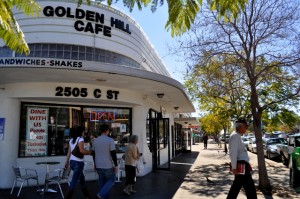 I recently looked out my front door and saw a woman sitting on the stairs of my patio. She was out of breath, sweaty and had a large basket next to her full of cans and plastic bottles to be recycled. She looked desperately in need of some rest and refreshment. I’m pretty good at ignoring people in need (sadly), but when they come to your physical doorstep, I couldn’t imagine not stepping outside to check on this woman.
I recently looked out my front door and saw a woman sitting on the stairs of my patio. She was out of breath, sweaty and had a large basket next to her full of cans and plastic bottles to be recycled. She looked desperately in need of some rest and refreshment. I’m pretty good at ignoring people in need (sadly), but when they come to your physical doorstep, I couldn’t imagine not stepping outside to check on this woman.
Opening our front door, she looked up at me with a bit of concern on her face thinking I might ask her to get off my patio. To calm her nerves, I simply sat down on the steps next to her and we exchanged warm smiles. Because she offered me a greeting in Spanish, I quickly realized she didn’t speak much English and I gave my best shot at speaking in Spanish. Over the next 10 minutes, we simply sat on my patio overlooking the main street of our neighborhood that runs in front of my house. Sometimes we talked, sometimes we just sat in comfortable silence. Her name was Conchetta. Finally, I asked if I could get her some food and a cold drink and she quickly said, “yes.”
After taking in some needed nourishment, Conchetta, offered me a warm smile filled with the richness of humanity and gratitude, and leisurely went back to work assembling the best of our neighborhoods “trash” so she could bring some life to her family.
Our faith community has spent a lot of time over the years becoming students of our neighborhood. As a result, we discovered that roughly 60% of our neighborhoods’ residents are Latino (most are Mexican because of our proximity to the border) and a high percentage of those are undocumented. In fact, it’s a safe assumption that my new friend, Conchetta, is undocumented.
As the “immigration issue” continues to be discussed in our country, for me, it is becoming much less of a political talking point and much more about genuine, human relationship. They are my friends. They are my neighbors. They are humans beings who live with the same needs, desires and aspirations as the rest of us. They have kids, grandkids, parents, brothers and sisters. They are children of a God who reigns over a global kingdom. A kingdom that was inaugurated in a Jesus who spent his life crossing borders to tangibly love the outsider and remind them of their sacred identity as sons and daughters of the Father and citizens of his kingdom. In the context of relationship, like I now have with Conchetta, “they” become “us.”
Obeying the greatest commandments of loving God and neighbor leaves my faith community and me with no choice but to pursue this issue with radical love and moral obligation. This isn’t yet another political debate to be waged in such a way that widens the partisan divide. It is a human reality with human implications that the Jesus Community must be waging peace right in the middle of.
May we walk with our friends – whether immigrants, ex-convicts, orphans, etc. – out of the shadows and into our homes, around our tables and begin co-creating a better future in the neighborhoods, cities and world in which we have each been entrusted.
—–
NOTE: After reading this, I have had multiple people inquire about what they can do. Here are a few suggestions:
1. Build friendships. Friendship not only humanizes issues, it moves us to action.
2. The Evangelical Immigration Table is a great organization that offers resources, spiritual disciplines and tangible actions around a biblical view of immigration.
3. Walk with your immigrant friends towards citizenship. There are courses we can take (offered by World Relief) that give us the credentials to offer immigration counseling that is desperately needed by those seeking citizenship.
Thanks Jon. A few thoughts:
I recently connected with a great organization: the center for farmworker families (http://www.farmworkerfamily.org/). Especially for those readers closer to the central coast, some great learning opportunities.
WWMD? What would a Mexican do? I think the western and predominately “white” church could definitely take a posture of learning and see how much more if a kingdom lifestyle most Mexicans are living.
And I recently read a quote “if the immigrant isn’t your brother, then God isn’t your Father.”